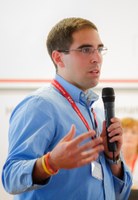The old adage “what doesn’t kill you makes you stronger” has become a sort of cultural trope we rely on when things don’t go our way, but is it true?
Until recently, any scientific attempts to test that theory have been flawed, according to Frank Infurna, assistant professor of psychology at ASU.
Frank Infurna
Infurna was recently awarded a $3.4 million grant from the Templeton Foundation to conduct research that seeks to improve upon past methods, to determine to what degree — if any — people experience personal growth following adversity, and what factors affect that growth.
“Throughout the course of our lives, we’re all likely to experience various forms of adversity,” Infurna said. “What this research aims to do is to understand how adversity can change us, but also — more importantly — to identify various factors, such as social support and coping strategies, that can be utilized in the future to promote more positive outcomes following adversity or trauma.”
Every year the Templeton Foundation awards roughly $70 million in research grants. They chose Infurna to receive this most recent grant based on his previous work with mental resiliency and his novel proposal.
In the past 15 to 20 years, Infurna said, research has used a single assessment tool, called the “post traumatic growth inventory,” to determine whether people perceive personal growth following adversity. The assessment consisted of a questionnaire, given to people after their adverse experience.
“The problem with that,” Infurna said, “is that we don’t know how they functioned before the trauma.”
In other words, without measuring an individual’s general disposition and perceived character strength before experiencing adversity, there’s no way to tell whether they actually experienced growth following a traumatic event.
Infurna’s proposed experiment will track a group of middle-age people for up to two years. They’ll be given monthly questionnaires to determine their outlook on life and perceived strength of character. Over the course of two years, some participants may experience traumatic events and some may not. For those who do, however, there will be data from before the trauma to compare with data following the trauma.
Each participant will also nominate a confidant — a close friend or loved one — who will be given a questionnaire every three months asking about the participant. Infurna and his colleagues will then be able to compare and contrast the perceptions of the participant with those of their confidant.
Infurna will be working with his colleagues at ASU, Suniya Luthar and Kevin Grimm, on the experiment that will track a group of middle-aged people and their confidants for up to two years. They have plans to launch their experiment in the upcoming year. Infurna will also be teaming with his co-project leader Eranda Jayawickreme, assistant professor of psychology at Wake Forest University, for the solicitation of applications from the larger research community across the country for their own experiments on post-traumatic resiliency.
“People have so many different perspectives and ideas when they approach this research,” Infurna said. “So to get a larger perspective, to see how other researchers will use their different expertise to approach this research question will allow us to better inform the literature on this topic.”
Infurna and Jayawickreme will make their final decisions on proposed contributing research projects in the fall.
“These types of grant opportunities do not come along very often,” Infurna said, “and to be able to stimulate research in this area is incredible, especially given my passion for this topic. We greatly appreciate this opportunity and are looking forward to getting started.”
More Science and technology
From wannabe high school math teacher to Regents Professor
It’s a bit difficult to describe the work Stephanie Forrest does as director of Arizona State University’s Biodesign Center for Biocomputation, Security and Society.Her ASU biography lays it out this…
Regents Professor recognized as pioneer in educational technology
Reading can transport people around the world — and back and forth in time.That’s what Danielle McNamara has helped tens of thousands of students do.McNamara is the executive director and…

Professor’s expertise in technology transfer leads to top faculty honor
Universities spend billions of dollars on research, and the process of transforming that work into goods and services for the public is more important than ever.ASU Professor Donald Siegel is an…

